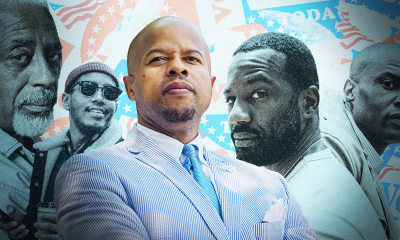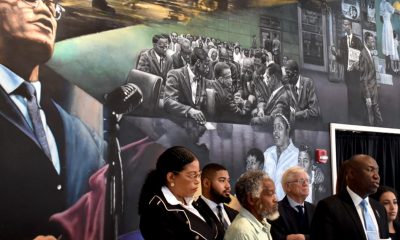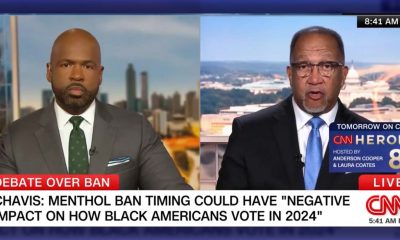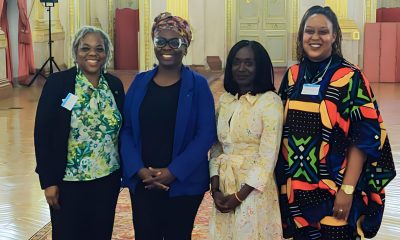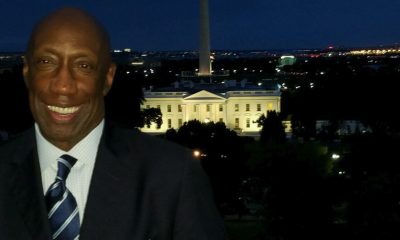Op-Ed
Black Americans’ Threat from Whites Wearing Badges
By Lee A. Daniels
NNPA Columnist
Is Raymond Wilford, a 26-year-old Black Seattle resident, not dead or seriously injured only because the White mall security officer who maced and then arrested him didn’t have a gun?
I’ll come to the deeply suspicious police killings of Michael Brown, in Ferguson, Missouri; of Eric Garner, in New York City; and of Ezell Ford, in Los Angeles momentarily. But it’s first worth considering what happened to Raymond Wilford on Saturday, August 9 as he walked to meet a friend at Seattle’s Westlake Mall.
His story reinforces what those three deadly incidents have dramatically illustrated: the potential threat from White men wearing badges of some sort of “authority” Black Americans – especially Black American males – face every day.
According to news reports, which include a video of the incident posted online, as Wilford approached the area of the mall where a peaceful pro-Palestinian rally was underway, he was suddenly accosted by a White man who was shirtless, and, witnesses later said, had been harassing the demonstrators with racist slurs. Much of the brief confrontation between Wilford and the man was captured in pictures and a video taken by a photographer who had been covering the demonstration.
Wilford, taken aback, raised his fists as if prepared to defend himself against the man whom he said was saying “a bunch of racial stuff” to him and had also raised his hands as if to fight. But neither man threw any punches.
That’s when the White mall security guard appeared and, according to Wilford and several witnesses, completely ignored the shirtless White man who was yelling and actually walking toward him, raised the can of pepper spray to Wilford’s face and sprayed him. In the video, witnesses can be heard yelling to the security cop, “You maced the wrong guy!”
The video also shows the security guard grabbing Wilford, now disabled by the pepper spray, by the arm and pulling him into the mall, the both of them followed by witnesses shouting that Wilford had done nothing wrong. A Seattle police officer, who had arrived late to the confrontation, told the witnesses not to interfere. Meanwhile, the White shirtless man, who has not been identified, just walked away.
Wilford told the Seattle Times that in the mall, he was given baby shampoo to wash his face, then after 25 minutes released at the order of a Seattle police officer. Wilford, a father of two who moved to Seattle a from New Orleans after Hurricane Katrina, said the security guard apologized to him before he was released, but that he’s considering filing a complaint.
For Raymond Wilford the White man with a badge of “authority” he encountered was armed – with a racist imagination, but, fortunately, also only with a can of pepper spray. So, the security guard’s completely mis-perceiving a potentially serious situation did not have serious consequences.
That assessment isn’t meant to diminish the personal anger and humiliation of these kind of encounters we know Blacks and other people of color constantly endure from “Whites with badges” in department and other kinds of stores, airports, schools and college campuses, and so on. It is to underscore the validity of a series of questions:
For example, if that Seattle mall security guard had had a gun, would Raymond Wilford’s name now be on the long list of unarmed Black men, women and children killed by “Whites with badges” in questionable circumstances? Broadening the focus of our questioning, does the desire to “control” Black people – or the fear of black people – that drove the security guard to such rash and wrong action also infect some number of police officers in localities all across America? Is that, at bottom, why Michael Brown, and Eric Garner, and Ezell Ford were killed?
After all, neither Michael Brown nor Ezell Ford was engaged in any wrongdoing when stopped by the police; and neither of them had any history of being a “troublemaker.” Neither did Eric Garner, whom police officials said was known to sell loose cigarettes on the streets of his neighborhood – a minor violation of the state penal code.
So, how is it that in all three of these instances, this one Black teenager and these two Black men ended up being killed by White police officers?
I suspect we already know the answer to that question in both these three specific circumstances and in the longer trail of innocent Black people being killed by White police officers. I think I see both those elements of White racism – fear and the desire to control – on tragic display in the video of Raymond Wilford’s unjustified arrest, which he survived, and in the video of Eric Garner’s unjustified arrest, which he did not.
Lee A. Daniels is a longtime journalist based in New York City. His essay, “Martin Luther King, Jr.: The Great Provocateur,” appears in Africa’s Peacemakers: Nobel Peace Laureates of African Descent (2014), published by Zed Books. His new collection of columns, Race Forward: Facing America’s Racial Divide in 2014, is available at www.amazon.com.
###
Commentary
California Respects the Power of Your Vote
As California Secretary of State, I do not take the progress we have made over the years lightly. My staff and I hold sacred the obligation to ensure that our elections are safe, free, fair, and accessible to all. Therefore, before certifying the results for this year’s election on Dec. 13, we have taken a number of steps to ensure that every vote is counted. We have also made sure that our ballot counting process is credible and free from interference.

By Shirley N. Weber, Ph.D.,
California Secretary of State
Californians can confidently claim this: California has made more significant reforms to our election laws and expanded voting rights than any other state.
The relevance of this accomplishment deepens as we prepare to celebrate the 60th anniversary of the Voting Rights Act next year. This landmark legislation began to undo our country’s long history of voter suppression, intimidation, and disenfranchisement that far too many Americans experienced at the polls for decades.
My own parents, who were sharecroppers, were denied their right to vote in the Jim Crow era South. Before moving to Los Angeles from Hope, Arkansas, my parents, David and Mildred Nash, could not vote. My father was an adult with six children before he registered to vote and was only able to exercise that constitutional right for the first time here in California.
As California Secretary of State, I do not take the progress we have made over the years lightly. My staff and I hold sacred the obligation to ensure that our elections are safe, free, fair, and accessible to all.
Therefore, before certifying the results for this year’s election on Dec. 13, we have taken a number of steps to ensure that every vote is counted. We have also made sure that our ballot counting process is credible and free from interference.
To meet that deadline without a hitch, California requires elections officials in all 58 counties to turn in their official results by a certain date. This year, that date was Dec. 6.
By law, every eligible voter in our state receives a vote-by-mail ballot. This ensures all registered voters can exercise their right to vote.
Whether you placed your ballot in a designated drop-off box, voted by mail, or cast your ballot at a polling center, votes are safe and secure. And we allow voters to sign up to receive text message, email, or voice call notifications about the status of their own ballots by using the Where’s My Ballot? tool. To learn more or to sign up, paste this URL in your web browser: https://california.ballottrax.net/voter/
The ballots of Californians who voted by mail are also protected. The United States Postal Service partners with the State to make sure ballots are delivered on time. All mailed-in ballots are sent by First Class mail with a postage paid envelope provided to every eligible registered voter.
Election Security is our No. 1 priority. That’s why my office designed and implemented a program to back up that commitment. For more information, visit this URL: https://www.sos.ca.gov/elections/election-cybersecurity
Additionally, California takes preventive actions to make sure our voting technology keeps our elections safe and protects everyone’s votes.
For example, county voting systems are not connected to the internet, which protects them from cyberthreats. The State also performs regular and rigorous testing to make sure the voting systems are working optimally, and only authorized personnel are granted access.
Staff members are also given phishing and cybersecurity training.
VoteCal, the state’s centralized voter registration system, is also key. The system is regularly updated, and it is used as a resource for counties to verify voter signatures.
California also provides security at all counting locations and makes sure ballot drop-off boxes are secured and monitored.
And all election processes are open to observation during specified hours.
In my role as Secretary of State of California, there is nothing more important to me than defending our democracy.
I am committed to safeguarding voting rights, and to leading our state in upholding the highest democratic standards by implementing policies and practices that Californians and all Americans can trust and look to for instruction and hope.
You can contact the California Office of the Secretary of State at 1-800-345-Vote or elections@sos.ca.gov with inquiries or to report suspected incidents or irregularities. Additional information can be found at www.sos.ca.gov and the office’s social media platforms:
Instagram: @californiasos_
Facebook: Facebook.com/CaliforniaSOS
X: @CASOSVote
Activism
COMMENTARY: PEN Oakland Entices: When the News is Bad, Try Poetry
Strongman politics is not for the weak. Here in the U.S., Donald Trump is testing how strongman politics could work in the world’s model democracy.

By Emil Guillermo
As the world falls apart, you need more poetry in your life.
I was convinced on Tuesday when a weak and unpopular president of South Korea — a free nation U.S. ally — tried to save himself by declaring martial law.
Was it a stunt? Maybe. But indicative of the South Korean president’s weakness, almost immediately, the parliament there voted down his declaration.
The takeaway: in politics, nothing quite works like it used to.
Strongman politics is not for the weak. Here in the U.S., Donald Trump is testing how strongman politics could work in the world’s model democracy.
Right now, we need more than a prayer.
NEWS ANTIDOTE? LITERATURE
As we prepare for another Trump administration, my advice: Take a deep breath, and read more poetry, essays and novels.
From “Poetry, Essays and Novels,” the acronym PEN is derived.
Which ones to read?
Register (tickets are limited) to join Tennessee Reed and myself as we host PEN OAKLAND’s award ceremony this Saturday on Zoom, in association with the Oakland Public Library.
Find out about what’s worth a read from local artists and writers like Cheryl Fabio, Jack Foley, Maw Shein Win, and Lucille Lang Day.
Hear from award winning writers like Henry Threadgill, Brent Hayes Edwards and Airea D. Matthews.
PEN Oakland is the local branch of the national PEN. Co-founded by the renowned Oakland writer, playwright, poet and novelist Ishmael Reed, Oakland PEN is special because it is a leader in fighting to include multicultural voices.
Reed is still writing. So is his wife Carla Blank, whose title essay in the new book, “A Jew in Ramallah, And Other Essays,” (Baraka Books), provides an artist’s perspective on the conflict in Gaza.
Of all Reed’s work, it’s his poetry that I’ve found the most musical and inspiring.
It’s made me start writing and enjoying poetry more intentionally. This year, I was named poet laureate of my small San Joaquin rural town.
Now as a member of Oakland PEN, I can say, yes, I have written poetry and essays, but not a novel. One man shows I’ve written, so I have my own sub-group. My acronym: Oakland PEOMS.
Reed’s most recent book of poetry, “Why the Black Hole Sings the Blues, Poems 2007-2020” is one of my favorites. One poem especially captures the emerging xenophobia of the day. I offer you the first stanza of “The Banishment.”
We don’t want you here
Your crops grow better than ours
We don’t want you here
You’re not one of our kind
We’ll drive you out
As thou you were never here
Your names, family, and history
We’ll make them all disappear.
There’s more. But that stanza captures the anxiety many of us feel from the threat of mass deportations. The poem was written more than four years ago during the first Trump administration.
We’ve lived through all this before. And survived.
The news sometimes lulls us into acquiescence, but poetry strikes at the heart and forces us to see and feel more clearly.
About the Author
Emil Guillermo is a journalist and commentator. Join him at www.patreon.com/emilamok
Bay Area
In the City Attorney Race, Ryan Richardson Is Better for Oakland
It’s been two years since negotiations broke down between the City of Oakland and a developer who wants to build a coal terminal here, and the issue has reappeared, quietly, in the upcoming race for Oakland City attorney. Two candidates are running for the position of Oakland City Attorney in November: current Assistant Chief City Attorney Ryan Richardson and retired judge Brenda Harbin-Forte.

By Margaret Rossoff
Special to The Post
OPINION
It’s been two years since negotiations broke down between the City of Oakland and a developer who wants to build a coal terminal here, and the issue has reappeared, quietly, in the upcoming race for Oakland City attorney.
Two candidates are running for the position of Oakland City Attorney in November: current Assistant Chief City Attorney Ryan Richardson and retired judge Brenda Harbin-Forte.
Richardson has worked in the Office of the City Attorney since 2014 and is likely to continue current City Attorney Barbara Parker’s policies managing the department. He has committed not to accept campaign contributions from developers who want to store and handle coal at a proposed marine terminal in Oakland.
Retired Judge Harbin-Forte launched and has played a leading role in the campaign to recall Mayor Sheng Thao, which is also on the November ballot. She has stepped back from the recall campaign to focus on her candidacy. The East Bay Times noted, “Harbin-Forte’s decision to lead the recall campaign against a potential future client is … troubling — and is likely to undermine her ability, if she were to win, to work effectively.”
Harbin-Forte has refused to rule out accepting campaign support from coal terminal interests or their agents. Coal terminal lobbyist Greg McConnell’s Independent Expenditure Committee “SOS Oakland” is backing her campaign.
In the 2022 mayor’s race, parties hoping to build a coal terminal made $600,000 in contributions to another of McConnell’s Independent Expenditure Committees.
In a recent interview, Harbin-Forte said she is open to “listening to both sides” and will be “fair.” However, the City Attorney’s job is not to judge fairly between the City and its legal opponents – it is to represent the City against its opponents.
She thought that the 2022 settlement negotiations ended because the City “rejected a ‘no coal’ settlement.” This is lobbyist McConnell’s narrative, in contrast to the report by City Attorney Barbara Parker. Parker has explained that the City continued to negotiate in good faith for a settlement with no “loopholes” that could have allowed coal to ship through Oakland – until would-be coal developer Phil Tagami broke off negotiations.
One of Harbin-Forte’s main priorities, listed on her website, is “reducing reliance on outside law firms,” and instead use the lawyers working in the City Attorney’s office.
However, sometimes this office doesn’t have the extensive expertise available that outside firms can provide in major litigation. In the ongoing, high stakes coal litigation, the City has benefited from collaborating with experienced, specialized attorneys who could take on the nationally prominent firms representing the City’s opponents.
The City will continue to need this expertise as it pursues an appeal of the judge’s decision that restored the developer’s lease and defends against a billion-dollar lawsuit brought by the hedge fund operator who holds the sublease on the property.
Harbin-Forte’s unwillingness to refuse campaign contributions from coal terminal interests, her opposition to using outside resources when needed, as well as her uncritical repetition of coal lobbyist McConnell’s claim that the City sabotaged the settlement talks of 2022 all raise serious concerns about how well she would represent the best interests of Oakland and Oaklanders if she is elected City Attorney.
-

 California Black Media4 weeks ago
California Black Media4 weeks agoCalifornia to Offer $43.7 Million in Federal Grants to Combat Hate Crimes
-

 Black History4 weeks ago
Black History4 weeks agoEmeline King: A Trailblazer in the Automotive Industry
-

 California Black Media4 weeks ago
California Black Media4 weeks agoCalifornia Department of Aging Offers Free Resources for Family Caregivers in November
-

 California Black Media4 weeks ago
California Black Media4 weeks agoGov. Newsom Goes to Washington to Advocate for California Priorities
-

 Activism3 weeks ago
Activism3 weeks agoOakland Post: Week of November 27 – December 3, 2024
-

 Activism4 weeks ago
Activism4 weeks agoOCCUR Hosts “Faith Forward” Conference in Oakland
-

 Activism4 weeks ago
Activism4 weeks agoRichmond Seniors Still Having a Ball After 25 Years
-

 Bay Area4 weeks ago
Bay Area4 weeks agoRichmond’s New Fire Chief Sworn In






